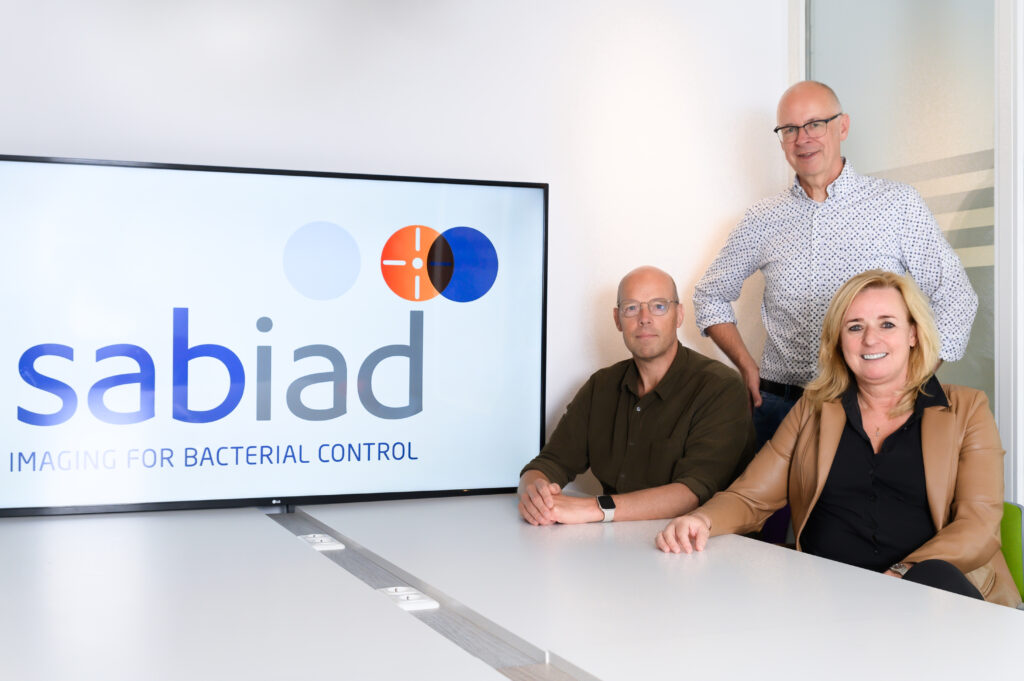The Open Diagnostics Ecosystem (ODE) is proud to introduce the newest project in the ecosystem, which will come from Sabiad. The goal of Sabiad, a spin-out of the UMCG, is bacterial imaging to enable early detection of infection to allow fast and appropriate treatment. Sabiad develops a monoclonal antibody, which visualises staphylococcal aureus related infections in the orthopedic implant area not only accurate, but also fast and minimally invasive. With the support of ODE, Sabiad will further develop their platform.
Daan van Oldeniel, Business developer at Open Diagnostics is excited about the new learning project: “We are thrilled to welcome Sabiad into the Open Diagnostics ecosystem. Their expertise and innovative contributions will undoubtedly enrich our collaborative efforts, propelling us even closer to our shared goal of advancing diagnostics for the betterment of healthcare worldwide.”
A rapid and precise diagnosis
Staphylococcus Aureus (SA) is the biggest malefactor when it comes to implant-associated infections, particularly in cases involving hip or knee replacements. One in 3 people carry the bacteria without symptoms, but if the bacteria enters the bloodstream during a surgical procedure, such as placing an implant, it can be dangerous. As a result, the primary application of this cutting-edge technology lies in providing a rapid and precise diagnosis. A rapid diagnosis is needed when there is an SA-related infection suspected, especially after prosthetic replacement. ‘’The main innovation of Sabiad’s solution is the use, for the very first time, of a monoclonal antibody for infection imaging. A few years ago, an antibody called 1D9 was developed in my group to detect staph aureus, which allows the bacteria to be identified.‘’ tells Jan Maarten van Dijl, one of the founders of Sabiad and professor medical microbiology and infection prevention of the UMCG.
Collaboration with the UMCG
Extensive market research and insights gathered from leading orthopedic surgeons have confirmed the immense potential of the technology from Sabiad, in the field of hip and knee revision surgery. This project is geared towards advancing the clinical, technical, and economic feasibility of Sabiad’s imaging agent, which is designed for the detection of SA-related infections in orthopedic surgery.
Furthermore, this initiative aims to establish Sabiad’s proof-of-concept by developing the necessary safety documentation for the antibody (1D9), enabling its use in a first-in-human clinical study. This study will be conducted in collaboration with the University Medical Center Groningen (UMCG).
Professor Paul Jutte (Orthopedics UMCG) is connected with Sabiad as advisor. He often experiences the misery that these types of infections and the late treatment have on his patients: ‘’Our patients with an infection of their orthopedic implant literally state that they have no life; they are ill, disabled and cannot participate in society. Faster and more accurate diagnosis with Sabiad platform technology is a fantastic development‘’
About Sabiad
Sabiad has been established in September 2022 by industry veterans Ton van den Hoven and Saskia van den Dool after the research period was completed as a spin-out of the University of Groningen with support of the UMCG Innovation Center. The innovation center within the UMCG helps health professionals and researchers in and outside the UMCG to turn their innovation into a success. The goal of Sabiad B.V is to enable early detection of bacterial infection. Read more information on Sabiad via www.sabiad.eu.

Source picture: Wenzel Photography

